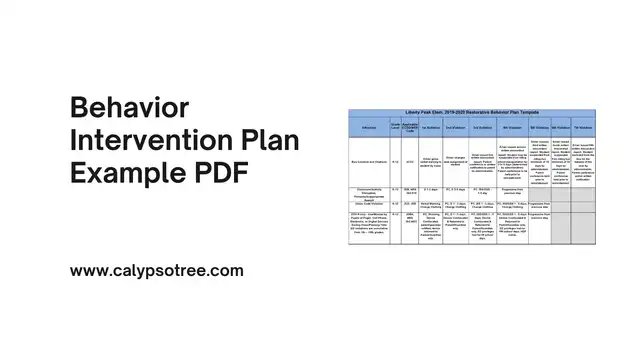Curious about the job description for a quality manager? Think of them as your company’s quality superhero, ensuring everything produced – cars, snacks, apps, you name it – is the absolute best it can be. They play a vital role in businesses of all kinds!
What Does a Quality Manager Do?
- Rulebook Master: They create the plans and rules everyone follows to guarantee top quality.
- Data Detective: They keep a close eye on numbers and information to find ways to make things even better.
- Team Leader: They guide and support the quality control team, like a coach helps their players shine.
- Cross-Team Collaborator: They work with different departments (like the folks who build stuff and the suppliers who provide parts) to ensure quality at every step.
- Customer Champion: They listen to customer feedback, fix problems, and use it to constantly improve.
Skills Needed to Be an Ace Quality Manager
- Quality Know-How: Being an expert on quality standards (like ISO 9001), using statistics, and knowing how to inspect stuff thoroughly.
- Leader and Communicator: Inspiring teams and clearly explaining quality goals and solutions.
- Problem Solver: Finding the root of problems and coming up with smart fixes.
- Detail-Oriented: Absolutely focused on catching even the tiniest flaws.
Where Do Quality Managers Work?
They’re in demand everywhere! Here’s a few examples:
- Factories: Cars, electronics, everything you can imagine being made.
- Hospitals and Clinics: Making sure patient care is safe and top-notch.
- Food and Drinks: Keeping your snacks and drinks delicious and safe to eat.
- Construction: Making sure buildings are strong and well-built.
- Tech Companies: Creating awesome software without glitches.
How Much Do Quality Managers Make?
Quality managers play a super important role in companies, and they are paid well for their expertise. The exact amount can change a bit depending on a few things:
- Experience: The more years you’ve been a quality manager, the more you’ll likely earn.
- Location: Some states or cities might pay more than others.
- Industry: Certain industries, like manufacturing or healthcare, might have higher salary ranges.
- Company Size: Big companies sometimes have bigger budgets for salaries.
The Salary Range
Most quality managers in the United States make between $70,500 and $110,000 per year. Some really experienced managers in the right situations can even make upwards of $128,000! Of course, there are some positions on the lower end of the scale too, closer to $38,500.
Where to Find Salary Info
Want to get more specific? Here are some great places to look:
- Job Boards: Sites like Indeed or Glassdoor often list salaries with job postings.
- Salary Surveys: Websites like Salary.com specialize in collecting salary data.
- Professional Groups: Organizations like the American Society for Quality (ASQ) might provide salary info to members.
Remember: Salary is just one part of the picture. Consider benefits, company culture, and if you’ll love the job when making your decision!
Quality Manager vs. Inspector/Engineer
Here are the differences between a quality manager, inspector, and engineer:
Quality Manager: The Big Picture Boss
- Focus: The overall system of how a company makes quality products or delivers great service.
- Duties: They set the rules, train the team, analyze data to spot trends, and make sure everyone is working towards the same quality goals.
- Think Like: The coach of a sports team, coming up with the winning strategy and motivating everyone to play their best.
Quality Inspector: The Product Detective
- Focus: Checking individual items or services to make sure they meet the standards.
- Duties: They use tools and checklists to find flaws, defects, or anything that doesn’t pass the test.
- Think Like: A referee closely watching the game, making sure the players are following the rules.
Quality Engineer: The Error Prevention Expert
- Focus: Designing quality into the process from the very beginning.
- Duties: They figure out ways to make products easier to build correctly, choose reliable materials, and set up systems to catch mistakes early.
- Think Like: The architect who designs a safe and sturdy building that won’t fall apart.
A quality manager relies on inspectors to find issues and engineers to help prevent them in the future. It’s a team effort to make sure customers get top-notch stuff!
Challenges and How to Overcome Them
Even quality superheroes like quality managers face tough challenges! It’s not always easy making sure everything is perfect, all the time. Here are some big obstacles they often run into:
The Challenges
Getting Everyone On Board
Sometimes people get stuck in their ways and don’t like new rules, even if those rules improve quality. Quality managers need to be super convincing and clearly explain the benefits of change.
Staying On Budget
It costs money to do quality checks, buy fancy equipment, and train people. Quality managers have to get creative about getting the most out of limited resources.
Deadline Pressure
Things need to get done fast, but quality can’t suffer! Managers have to find a balance between speed and doing things right the first time.
Staying Updated
Quality rules (like ISO 9001) change sometimes. Managers must always be learning and updating their systems to stay top-notch.
Fixing Deep Problems
Sometimes the trouble isn’t a quick fix. It takes serious investigation, like a detective finding the root cause of a quality issue, and that takes time and effort.
Smart Solutions for Quality Champions
- Strong Communication: Be clear, patient, and focus on the “why” behind quality changes.
- Planning Power: Anticipate costs and build a strong case to get the money needed for quality tools.
- Efficiency is Key: Find ways to streamline quality checks without sacrificing accuracy.
- Learn and Grow: Attend training sessions and stay updated with the latest industry standards.
- Teamwork Wins: Collaborate with other departments to build quality into the work from the very beginning.
While being a quality manager has its tough moments, it’s incredibly rewarding. By overcoming these challenges, you become a problem-solving expert and help your company deliver its very best to customers.
What are the career progression opportunities for a quality manager?
Here’s career progression opportunities for a quality manager:
- Senior Quality Manager: Lead a bigger team and tackle more complex quality issues across a company.
- Director of Quality: Set the overall quality strategy for an entire organization, like being the boss of all quality bosses!
- Quality Consultant: Use your expertise to help multiple companies improve their quality game. You get to be your own boss!
- Specialization: Become an expert in a specific area, like quality in healthcare or software development. This makes you super valuable in that industry.
- Teaching and Training: Share your knowledge and help others grow in the quality field.
How to Climb the Quality Ladder
- Never Stop Learning: Certifications (like Certified Quality Manager), conferences, and courses keep you sharp.
- Build Your Network: Connect with other quality professionals. Mentors and colleagues can open doors.
- Go the Extra Mile: Volunteer for special projects and show you’re ready for more responsibility.
Quality managers are needed in pretty much every industry. That means you get choices! You could move between different types of companies or focus on a field you’re passionate about.
Tailor Your Resume
Here’s a guide on tailoring your resume for a quality manager position:
Keywords are Key
- Study the Job Ad: Look closely at the job description. They’ll tell you EXACTLY what skills and experience the company wants.
- Sprinkle Them In: Weave those keywords throughout your resume, but make it sound natural!
Numbers Talk
- Quantify Your Wins: Instead of saying “improved quality,” try “reduced defects by 25%” or “increased customer satisfaction by 10%.”
- Show the Impact: Numbers make your accomplishments way more powerful.
Skills Spotlight
- Must-Haves: Include the core quality manager skills: quality standards (like ISO 9001), problem-solving, auditing, etc.
- Transferable Skills: Did you lead teams, manage projects, or communicate tough stuff in another job? Those are HUGE for quality managers too!
Action Words Pack a Punch
Start bullet points with strong verbs:
- Instead of “Responsible for…” try “Developed,” “Implemented,” “Analyzed,” or “Led.”
Don’t Forget the Basics
- Format for Success: Keep it clean, easy to read, and use a professional font.
- Proofread Like a Pro: A single typo can ruin all your hard work. Get a friend to help!
Example
Instead of: “Oversaw quality inspections”
Try: “Led daily inspections, reducing defects by 15% and boosting on-time delivery.”
What certifications are beneficial for a quality manager?
Here’s a breakdown of valuable certifications for quality managers:
Certified Quality Manager (CQM/OE)
This is the gold standard, offered by the American Society for Quality (ASQ). It proves you know quality management inside and out.
Certified Quality Auditor (CQA)
Also from the ASQ, this one focuses on your auditing skills, which are super important for finding quality issues.
Certified Quality Engineer (CQE)
This one delves deeper into preventing quality problems from the start, through design and process improvement.
Six Sigma
Comes in different levels (Yellow Belt, Green Belt, etc.). It’s all about using data and statistics to make processes super-efficient and reduce errors.
Lean Manufacturing
Focuses on eliminating waste and maximizing value for the customer – a big part of quality!
Why Get Certified?
- Stand Out: Makes your resume shine and shows you’re committed to the field.
- Boost Your Paycheck: Certified professionals can often earn more.
- Expand Your Knowledge: You’ll learn tons of new stuff and get fresh perspectives on quality problems.
Want to Learn More?
- American Society for Quality (ASQ): https://asq.org/
- Industry Magazines: Check ones related to your field for the latest quality trends.
Sample Job Description for a Quality Manager
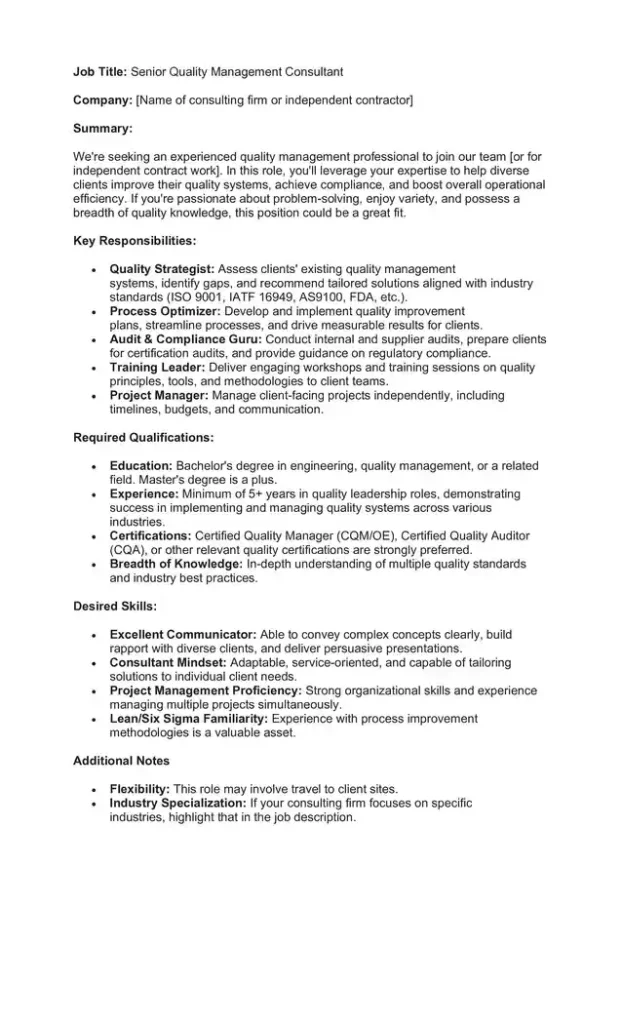
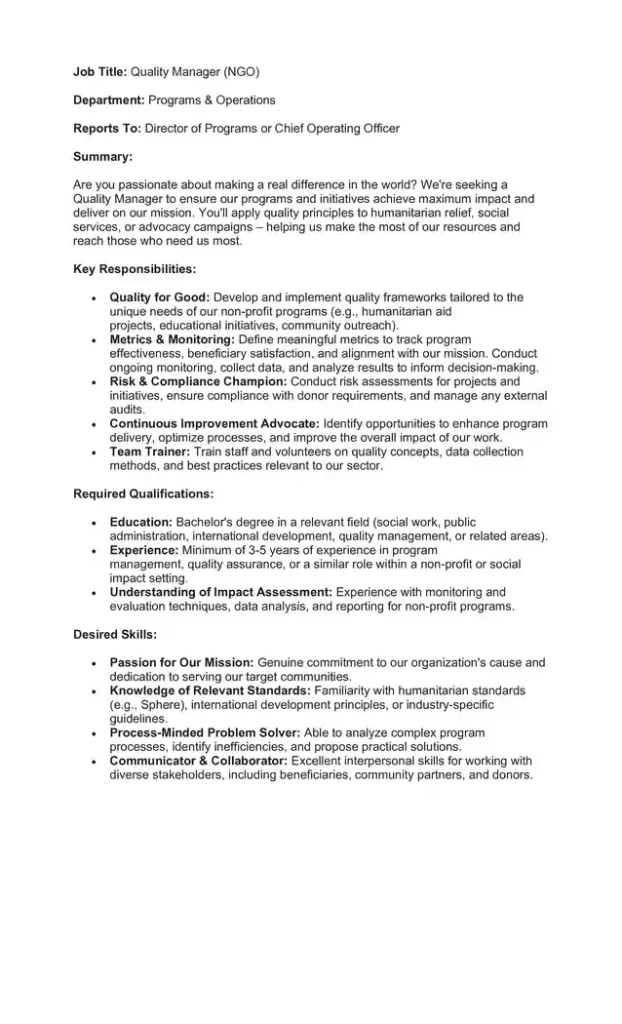
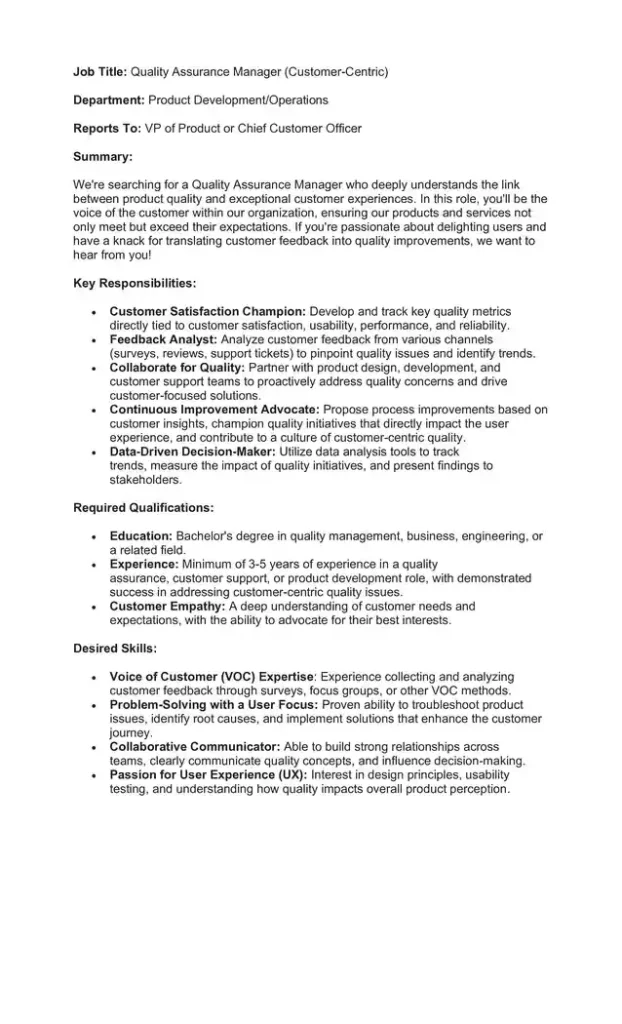
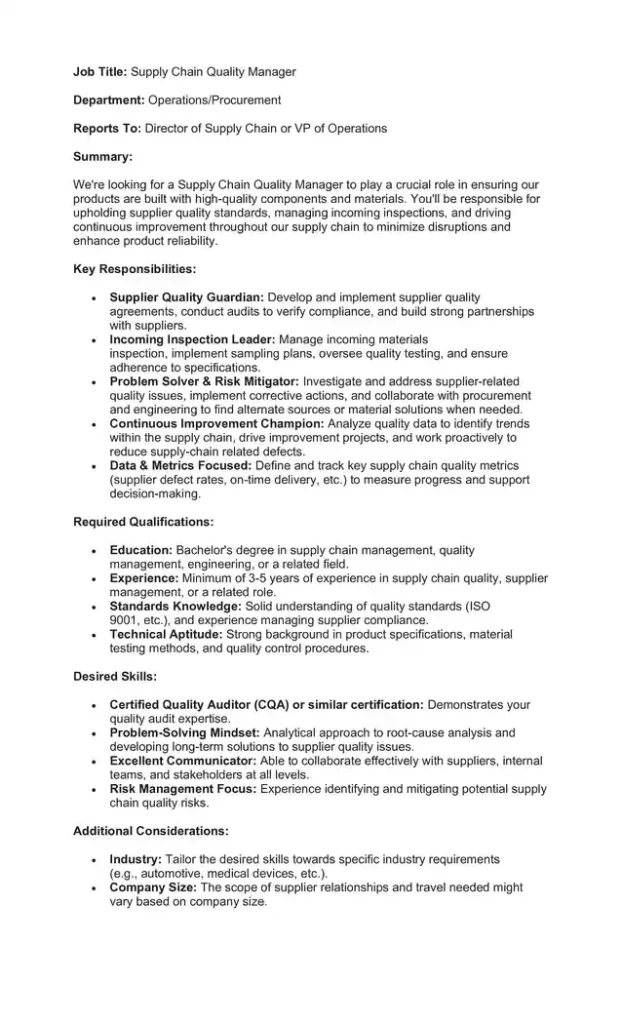
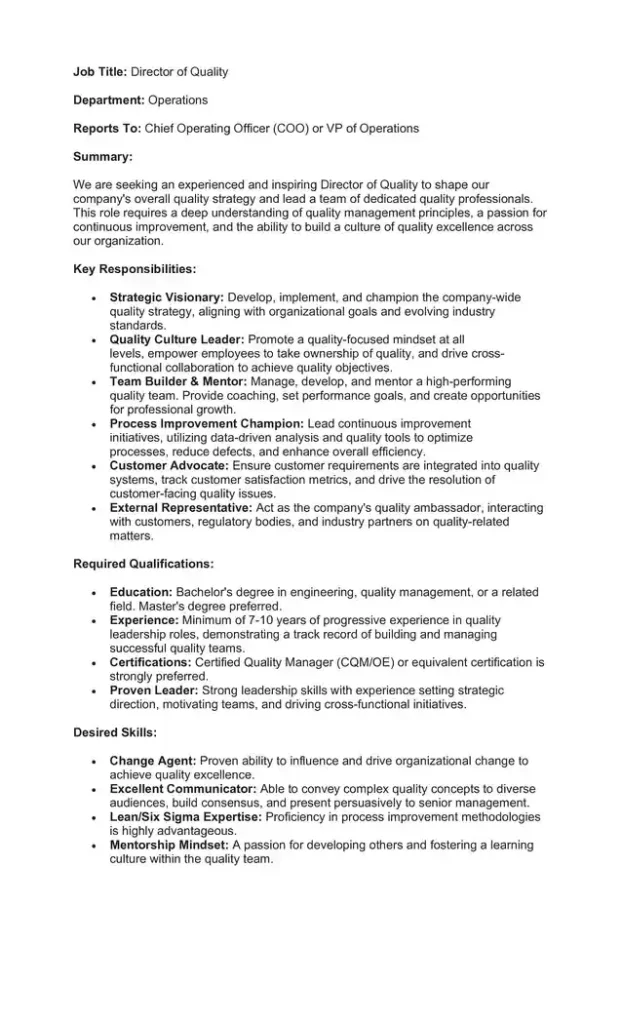
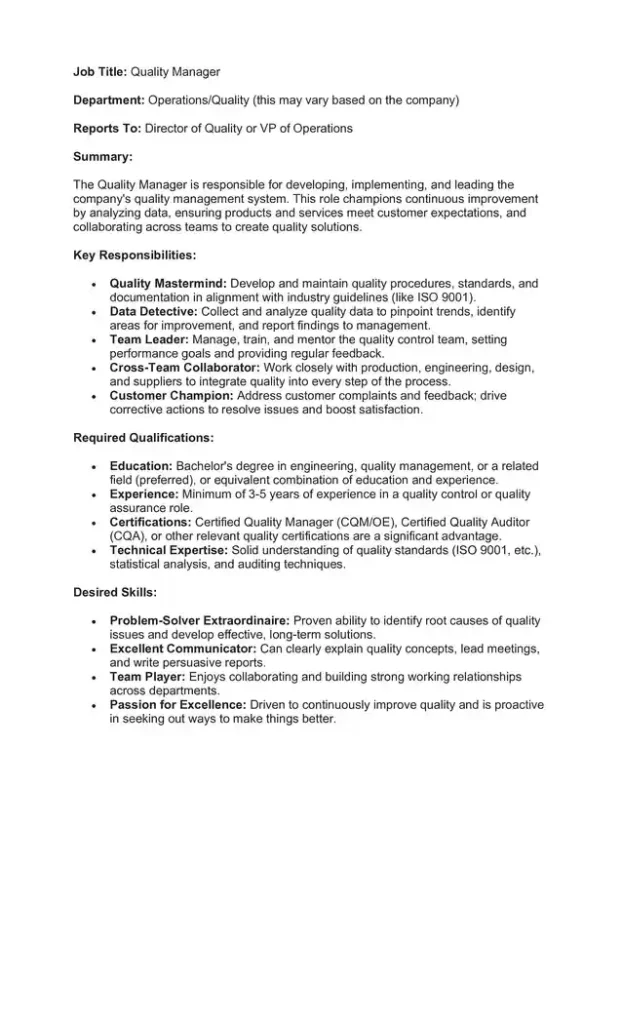
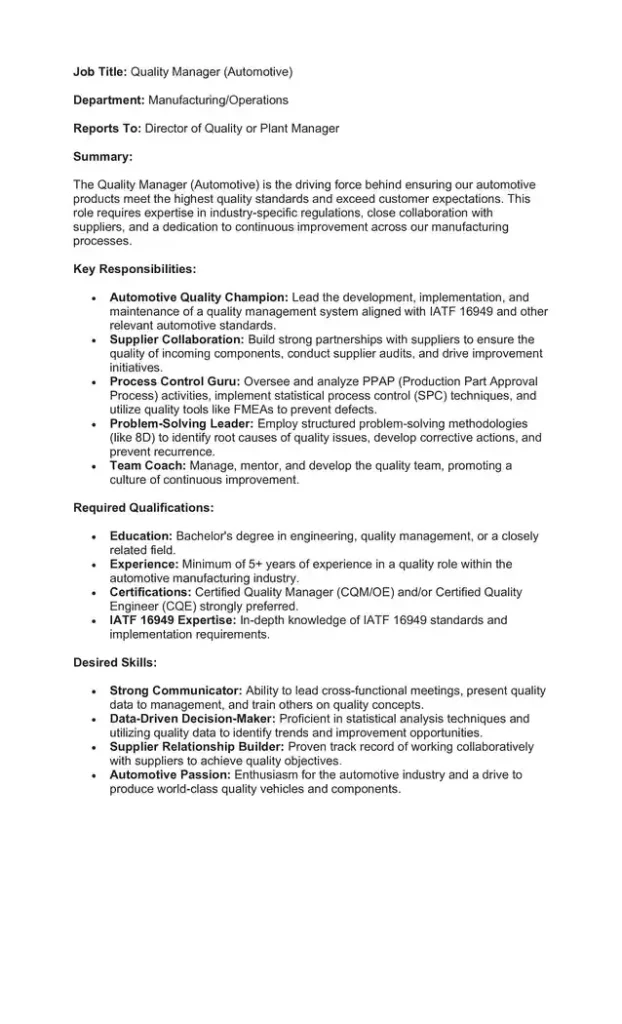
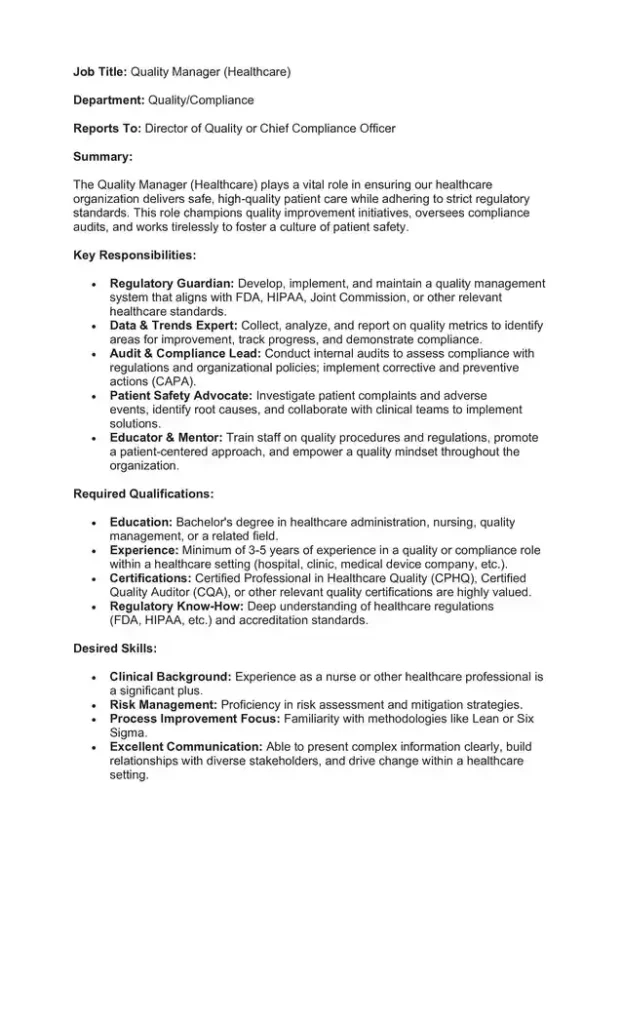
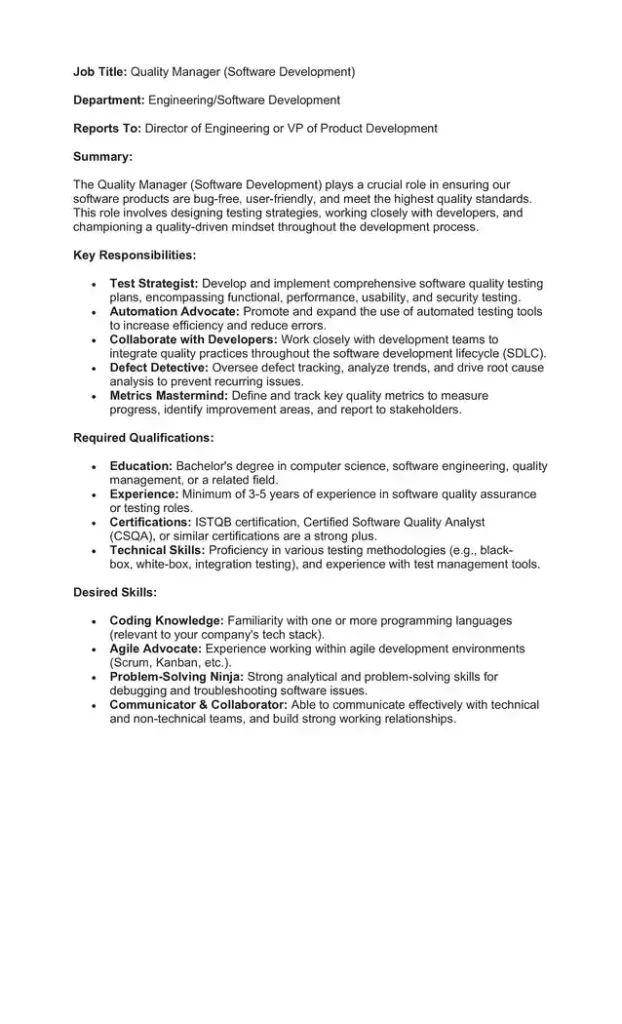
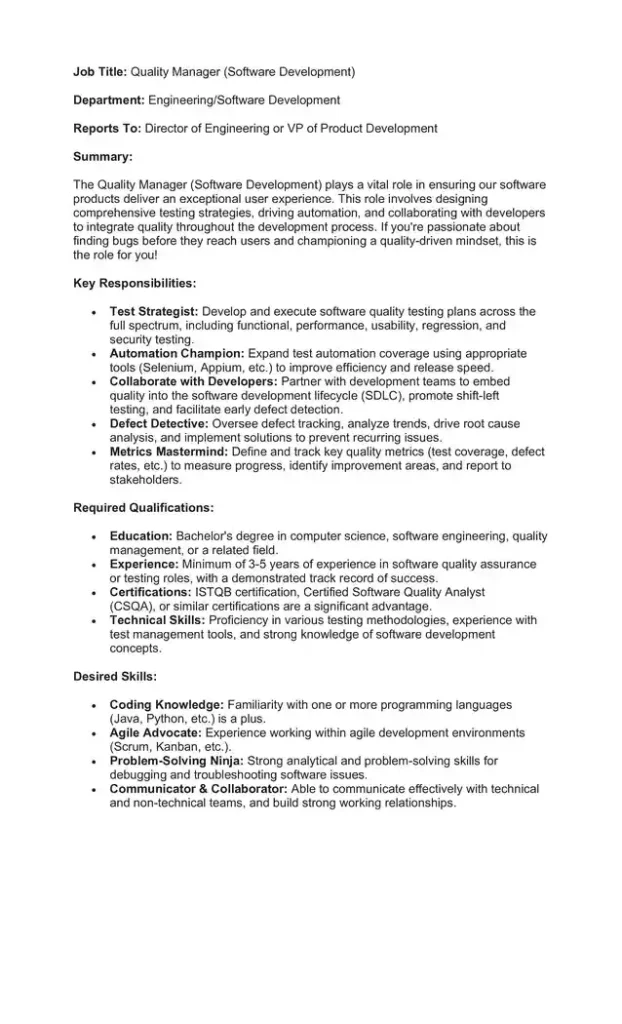
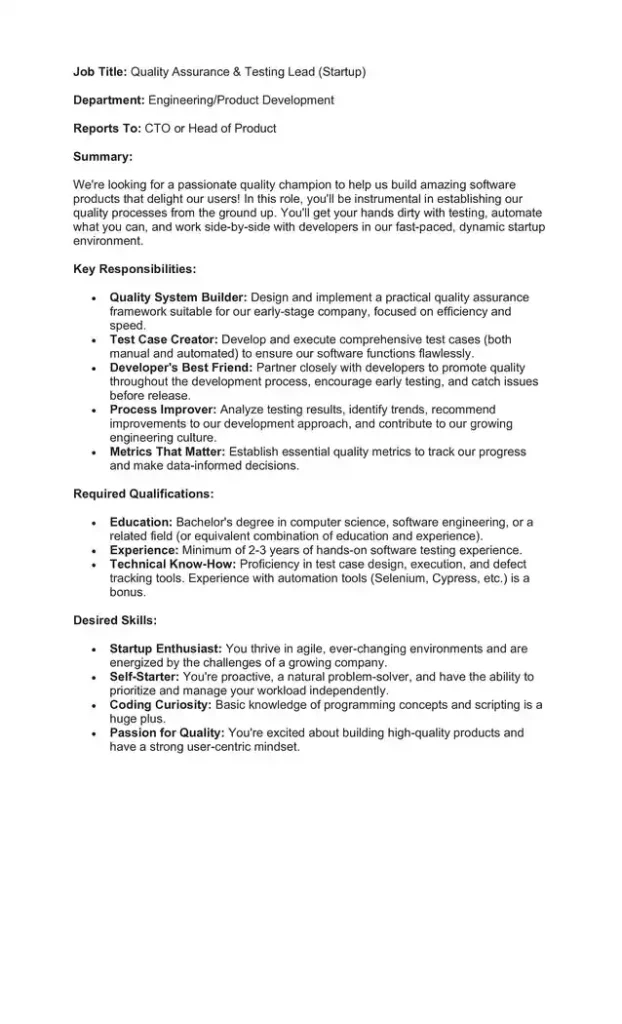
FAQ
Q: Do I have to have a college degree to be a quality manager?
A: A degree in engineering or something similar helps, but it’s not the only way in! If you have experience, some awesome certifications, and are a great problem-solver, you can totally do this job.
Q: Where do most quality managers work?
A: You’ll find them in factories, hospitals, and tech companies. But really, quality matters EVERYWHERE – even restaurants and construction sites need quality managers!
Q: Can I work as a quality manager from home?
A: Sometimes! If you’re a consultant or really experienced, you might be able to. But a lot of the job is about checking things on-site and working as a team.
Q: I hear about quality control and quality assurance…what’s the difference?
A: Think of it like this: quality control is catching mistakes in each product, and quality assurance is the big-picture plan to make sure things are made right in the first place. Quality managers handle both!
Ready to explore the job description for a quality manager? This role is vital for company reputation and customer loyalty. If solving problems and ensuring excellence excites you, a quality management career could be your perfect fit!

Alexander is a skilled HR expert who writes clear and compelling job descriptions. He has spent over 15 years in the HR field, helping companies find and keep the best employees. With a degree in Human Resources Management from the University of Chicago, he has the knowledge to back up his experience.







